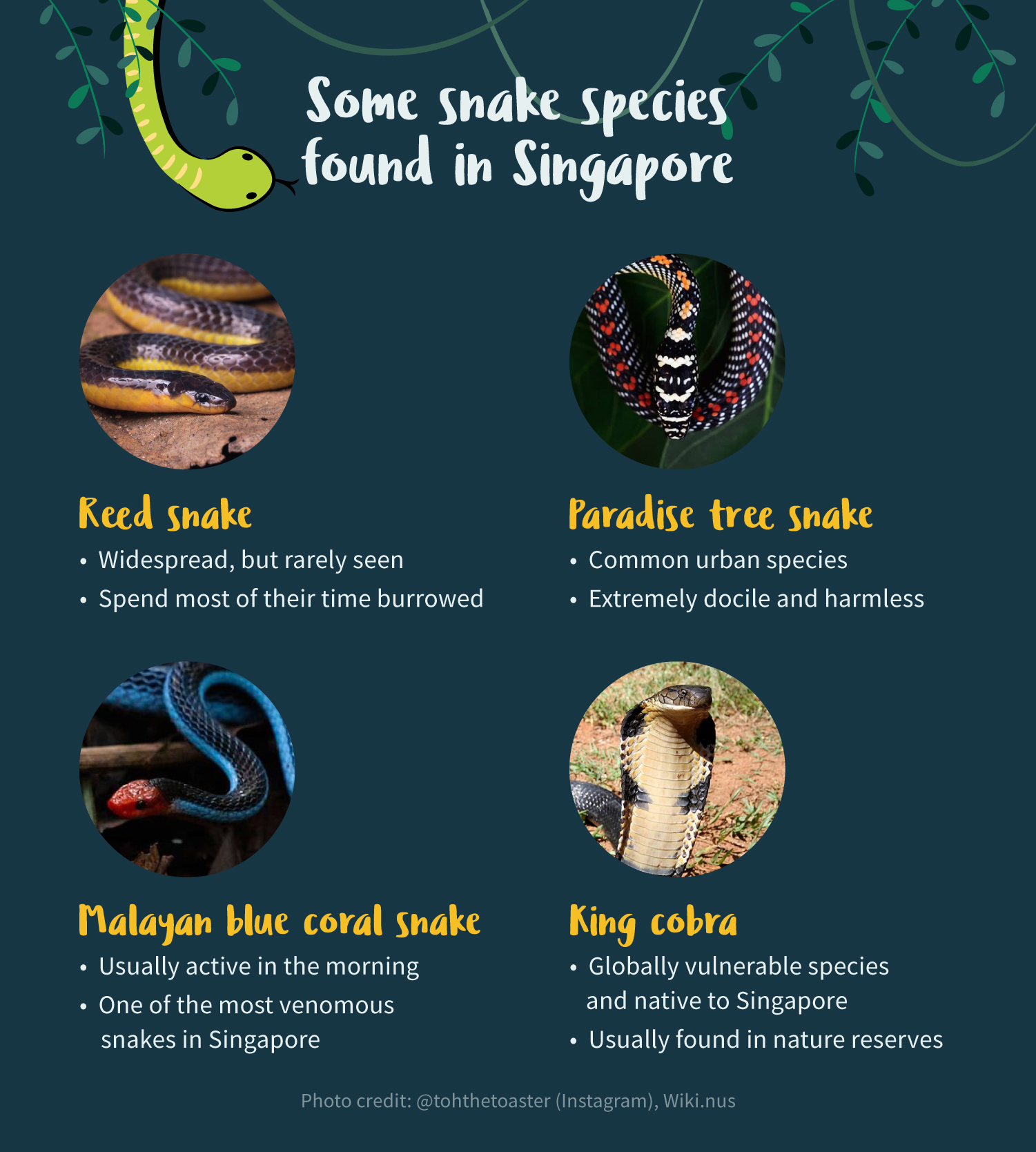Unexpected Wildlife Encounters: What Do You Do And Whom Do You Call?

Given the current COVID-19 travel restrictions, more people are exploring Singapore’s wild spaces and encountering wildlife. Increasingly though, some of these creatures have been spotted in our neighbourhoods as well. While some may appreciate Singapore’s biodiversity, it may shock and frighten others.
Here at Challenge, we are taking you through some of the commonly sighted animals around Singapore, what you should or should not do if you spot them, and when you should call agencies such as Animal Concerns Research and Education Society (ACRES), Society for the Prevention of Cruelty to Animals (SPCA), and National Parks Board (NParks).

Wild Boars
Wild boars are naturally shy creatures. Unfortunately, they have become bold and aggressive due to human interference in their feeding habits (see section below on feeding animals).
When encountering a wild boar, the key is to not run. The National Parks Board (NParks) recommends staying calm and moving away slowly. Do not try to corner or provoke it, especially if you see an adult with its young. In such scenarios, they tend to be more protective of their herd, and could attack if they feel threatened by you.
NParks has a series of webinars on human-wildlife encounters. Register for the upcoming June 19 session on wild boars, and check out past sessions featuring macaques, otters, and more on NParks’ YouTube channel.

Monitor Lizards
Observe them from afar, especially if you encounter them in a forest, mangrove swamp or water bodies. They do not attack humans unless provoked or cornered. However, in the rare event that you are bitten, seek medical attention immediately. A bite from a monitor lizard is not fatal, but could cause a bacterial infection.

Hornbills
The oriental pied hornbill has become a common sight due to conservation efforts since the mid-1990s. They have been spotted in several parts of the island, and even homes. They could be drawn to fruiting plants, or even caged birds, which provide opportunities for these omnivorous creatures to feed.
“Keeping pet birds in a protected aviary may help. While it is unfortunate to lose a pet animal, a bird left in a small cage is defenceless with no place to fly to or hide from,” Dhanushri Munasinghe, a Wildlife Management Executive at ACRES, told Challenge.

Macaques
Urbanisation over the decades has increased contact between monkeys and humans in Singapore. If you come face-to-face with one, remain calm and avoid direct eye contact. Do not make sudden movements that could alarm or agitate the monkey. Instead, look away and back off slowly. If you’re holding an object that is attracting the monkey’s attention, conceal or discard it altogether.
Understanding Monkey Behaviour

Learning to identify the expressions on a monkey’s face can help you better understand its behaviour. Illustration: SPCA

Otters
Otters have been spotted at several water bodies around Singapore, and were once seen crossing Orchard Road. Facebook group, Ottercity, suggests observing them from at least 10 metres away, which is also a safe distance from which to take pictures. Do not chase them, and prevent children from doing so as well. The otters might take you or the child for a predator, and attack in self-defence.
To prevent otters from entering homes and feasting on pet fish, experts recommend installing barriers around a pond or using a mesh to cover it. Any gaps around the property should also be properly sealed.
“Another way to discourage otters is to replace large-sized fish such as koi with smaller ones, which are less attractive to them,” ACRES’ Dhanushri Munasinghe said.

Snakes
Around 70 species of snakes exist in Singapore. Not all of them are venomous, and most would rather avoid contact with humans.
Still, when in doubt, stay as far away as possible and do not attempt to handle one on your own. If you encounter a snake in natural spaces like parks, nature trails, or water bodies, let it be – it would generally move away or hide when seen.

If found within a built environment (at home for example), call ACRES’ 24-hour wildlife rescue hotline. While waiting for them to arrive, keep a safe distance and do not try to attack it. Make sure young children and pets are kept away as well. It would also help to close all other doors except openings that could serve as an escape route for the snake.
TIPS
No Flash!
By all means, take a photograph of an animal you come across. But do it from a safe distance and avoid using flash photography, even at night. This applies to ANY animal you encounter. The flash may agitate the creature—just as it does us humans—and it might react in a manner that could potentially be unpleasant for you.
Do Not Feed Them

Call for Help
If you encounter these or other animals in natural spaces, simply leave them alone and move away slowly – unless the animal is injured and needs help. It would also be useful to remember that harming or killing animals is prohibited by law.
If they find their way into your home or neighbourhood, do not attempt to handle them on your own – this includes the need to clear animal carcasses. Instead, call for professional help.
For additional information or assistance, you can contact:
Alternatively, get onto the One Service app, a one-stop community platform by the Municipal Services Office to meet diverse municipal needs. They will direct you to the most relevant partner to resolve your wildlife problem.

To get more stories like this, subscribe to the Challenge newsletter or follow the Challenge Telegram channel.
- POSTED ON
Jun 3, 2021
- TEXT BY
Keval Singh
- ILLUSTRATION BY
Ryan Ong









